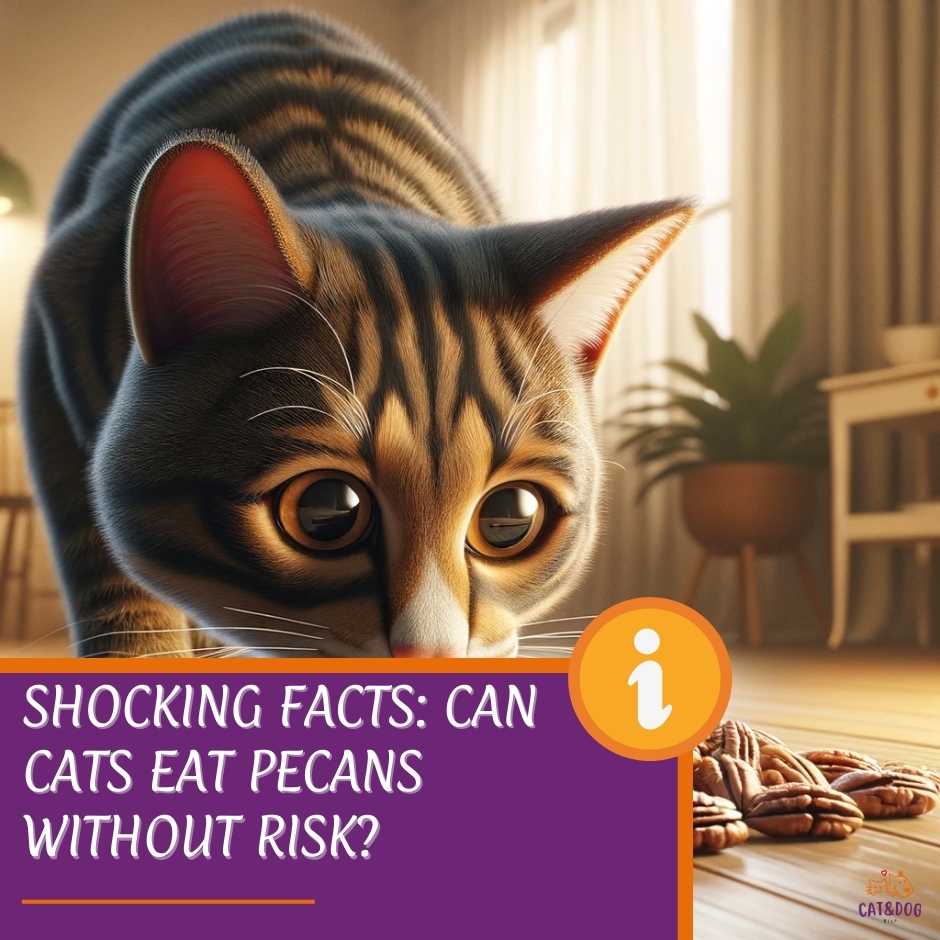Have you ever watched your feline friend eye the pecans on your countertop and wondered if it’s safe to share a nibble with them?
It’s a common question among cat owners, especially with the growing trend of being attentive to the nutritional needs and safe diet options for pets.
Cats’ dietary needs are unique, and it’s crucial to understand if your curious cat, would enjoy pecans and which human foods, like pecans, are safe for feline consumption. (1)
So, can cats eat pecans?
While pecans are a beneficial addition to the human diet, the nutritional needs of cats are vastly different from humans, so pecans should be seen as a rare treat for them.
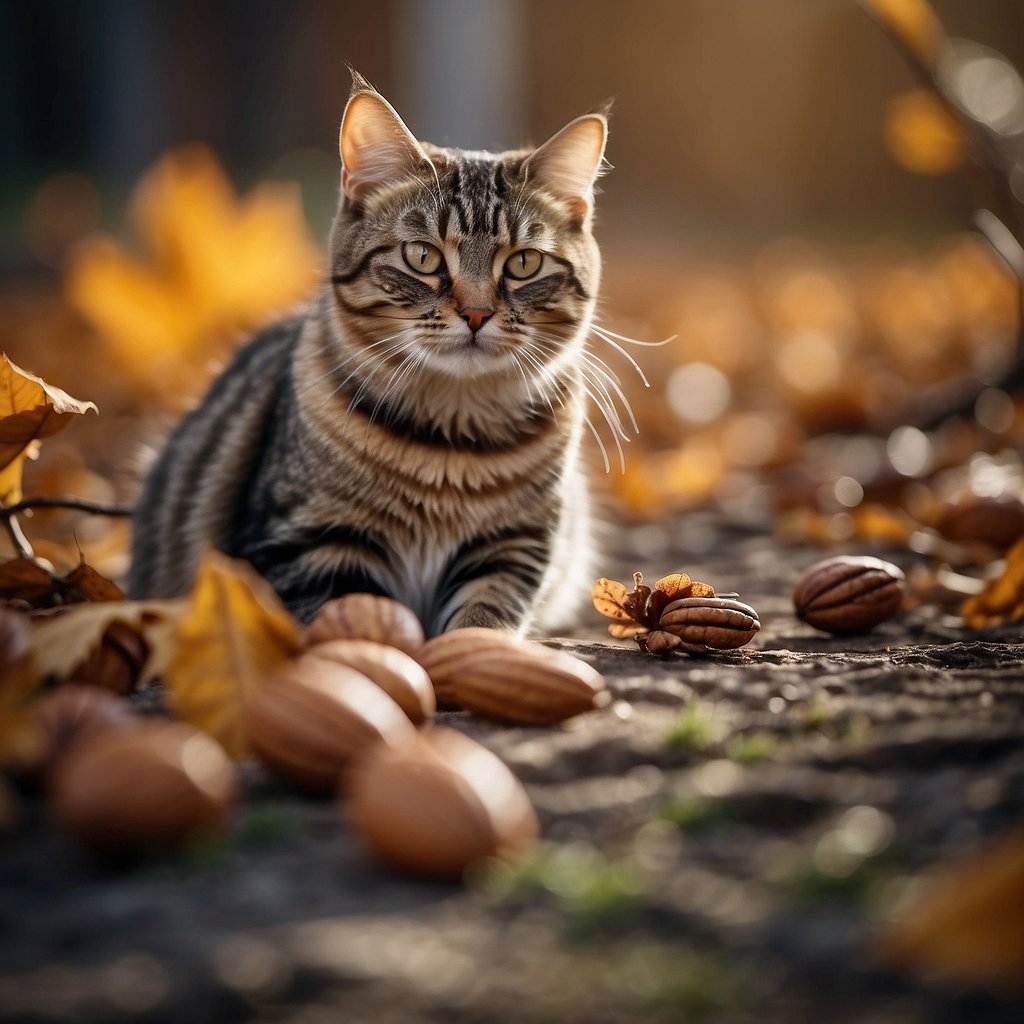
As the interest in feline nutrition rises, so does the amount of information available online.
While it might be tempting to treat your cat to a pecan, knowing the nuts and bolts of what they can and cannot consume is necessary.
You want to make sure that what you’re feeding your furry companion is both safe and beneficial to their health, without causing any unwanted side effects. (2)
The best way to ensure the health and well-being of feline companions is to focus on providing a balanced, species-appropriate diet, which is the simple answer when it comes to determining the quantity and type of nut ingested.
Key Takeaways
- Cats can ingest pecans, but they shouldn’t be a regular part of their diet.
- Pecans are high in fat and can cause digestive problems in cats.
- Always consult with a veterinarian for personalized advice on feeding your cat pecans.
Nutritional Profile of Pecans
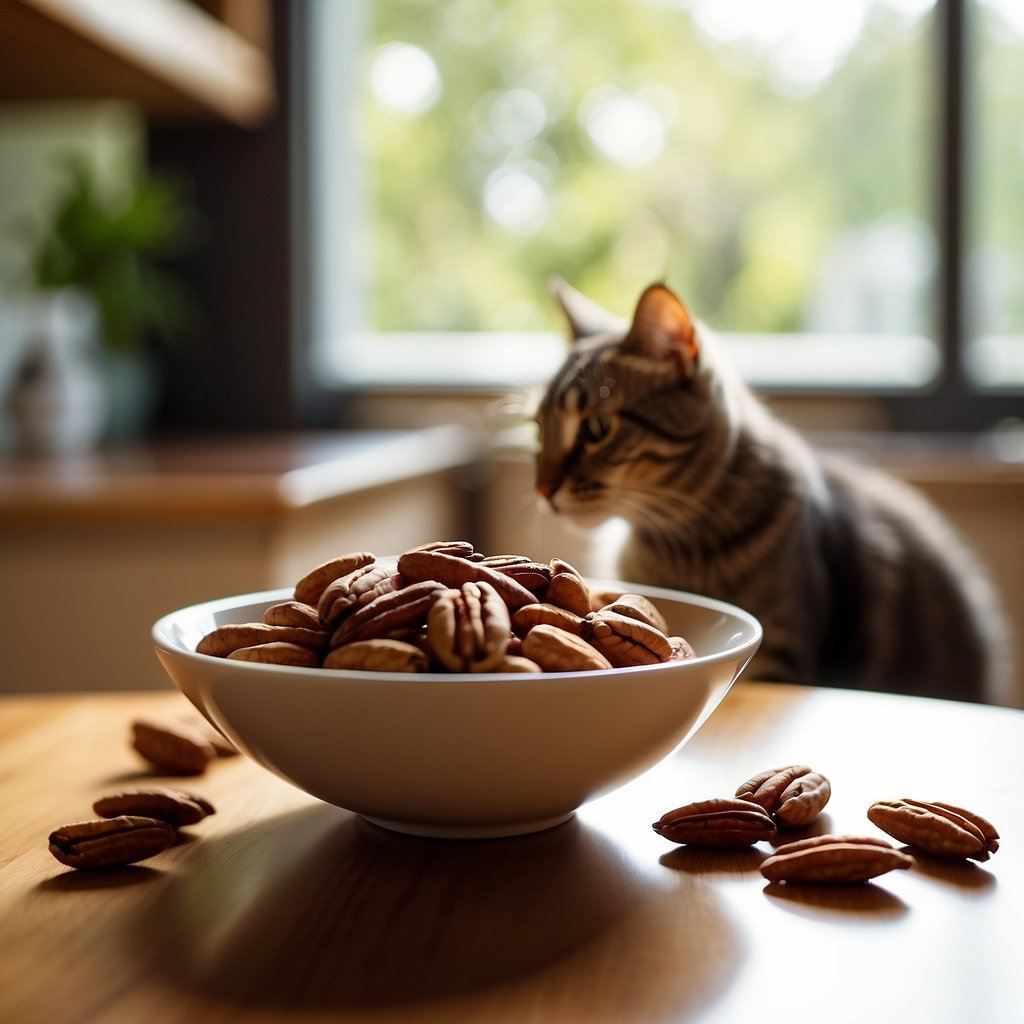
Have you ever peeked inside your pantry and wondered if those buttery, crunchy pecans could be more than just a treat for you? Let me share the skinny on what these nuts pack.
Pecans are somewhat of a powerhouse when it comes to nutrients.
They bring to the table a generous dose of fats—about 20.4 grams of fat per ounce—but it’s mainly the heart-friendly kind, with an inclusion of omega-3 fatty acids. (3)
Here’s a glance at what else these nuts contain per ounce:
- Calories: 196
- Protein: 3 grams
- Dietary Fiber: 2.7 grams
- Vitamin A and E
- Calcium
- Potassium
- Zinc
Notice how these nutrients are pretty beneficial for omnivores, right? But here’s where it gets interesting; your feline friend has different dietary needs.
Cats are obligate carnivores, meaning their bodies are designed to get most of their nutrients from animal products.
While a little plant-sourced food won’t hurt, as a general rule, cats should not be fed table scraps or human food unless you research their unique nutritional needs.
So, this spread of nutrients in pecans, especially the fats, if given in excess, could potentially tip the scales, leading to an overweight kitty. Remember, chubby may be cute, but healthy is the goal!
In a nutshell (pun intended), pecans have a dense nutritional profile that doesn’t quite align with what your cat needs.
It’s like trying to fuel a diesel engine with regular gas—it might work for a bit, but it’s not what the engine was built for.
For more cat diet tips and to understand how treats like pecans fit into a healthy and balanced diet for your feline friend, always prioritize foods that cater to their carnivorous nature
Keep those pecans for yourself, and let’s find kitty treats that cater to those carnivorous cravings and avoid digestive issues and other health problems, including heart disease, for your feline friend who requires a diet high in animal proteins.
Can Cats Eat Pecans Safely?
Have you ever wondered while munching on pecans if your feline friend can join in? Let me tell you, while pecans are not toxic to cats, they’re not the ideal snack for your kitty.
Potential Health Benefits for Cats
- Energy Source: Pecans are high in fats that could provide energy. However, cats have specific dietary needs that pecans don’t fulfill. (4)
Risks and Concerns
- Allergic Reactions: Just like people, some cats might be allergic to nuts.
- Digestive Upset: Your cat’s digestive system might not take kindly to pecans. Here’s why:
- High-Fat Content: Cats aren’t built to process a lot of fat found in nuts.
- Fiber Content: This can be tough on their tummy, leading to unpleasant episodes of diarrhea or vomiting.
- Pecan Toxicity: Uncommon, but some cases have shown that molds present on pecans can produce toxins harmful to pets.
Before you yield to those pleading kitty eyes, remember these points:
- Caloric Intake: Pecans are high-calorie and could lead to weight gain.
- Nutritional Value: Cats are obligate carnivores, which means they get their nutrients from a meat-based diet. Pecans don’t quite fit the bill.
If you’ve given your cat pecans before, don’t worry. A nibble here or there isn’t likely to cause a catastrophe, but it’s best to stick to treats made just for cats.
Keep those pecans to yourself and find a feline-friendly snack your cat can safely enjoy!
Safe Feeding Practices
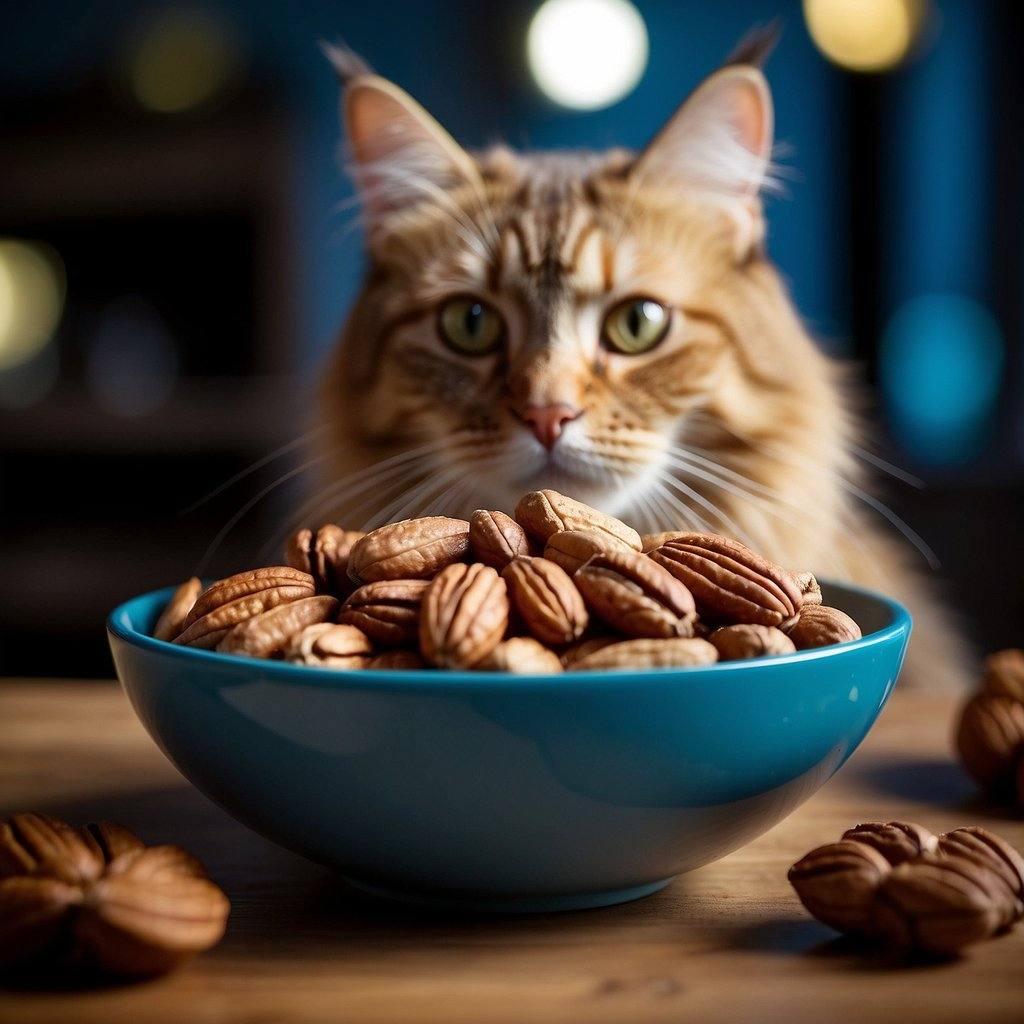
Curious if your cat can nibble on some pecans? A little nibble won’t hurt, but let’s chat about how to keep it safe!
How to Introduce Pecans to Cats:
- Start small – think crumb-sized.
- Observe your kitty for any odd reactions post-snack. No one knows Mr. Whiskers better than you!
Recommended Quantities:
- Keep it to a minimum; a piece or two should be your limit. Cats don’t need nuts in their diet, after all.
Remember, your cat’s health comes first, so let’s keep those pecan treats sparse and special. Cats and pecans can coexist – just sparingly and cautiously!
Diverse Expert Opinions
Ever wondered if it’s okay to toss a pecan to your purring pal? You’re not alone! Let’s chew over some opinions from the cat food gurus.
Views from Different Feline Nutritionists
– The Minimal Risk Advocates: Some nutritionists give a cautious thumb up.
They say pecans aren’t toxic, but they’re like candy to cats—tasty but not too healthy. Your cat probably won’t turn into a furry firework after eating a few, but staying informed about your cat’s nutritional needs is essential..
– Digestive Health Defenders: On the flip side, digestive woes wave a red flag. High fat and fiber levels in pecans might leave your kitty’s tummy in knots.
Think diarrhea and vomiting—not the best thank you for that nutty nibble.
Research Findings on Cats and Nuts:
Who doesn’t love a good study, right? Sadly, there’s more literature on cat memes than their nutty diets. However, one thing’s for sure: cats are obligate carnivores, so meat’s their jam, not nuts.
So, should you crack the pecan case open for your cat? Experts say moderation is key, with a slant on ‘maybe skip it.’
There’s no nutritional jackpot in it for them, and the potential tummy trouble might not be worth the risk.
Remember, your cat’s well-being is top-tier, so before letting them go nuts with nuts, a little vet chat could save you a whole lot of meows and woes. Keep your fluff ball thriving with the right chow choices!
Long-Term Dietary Considerations
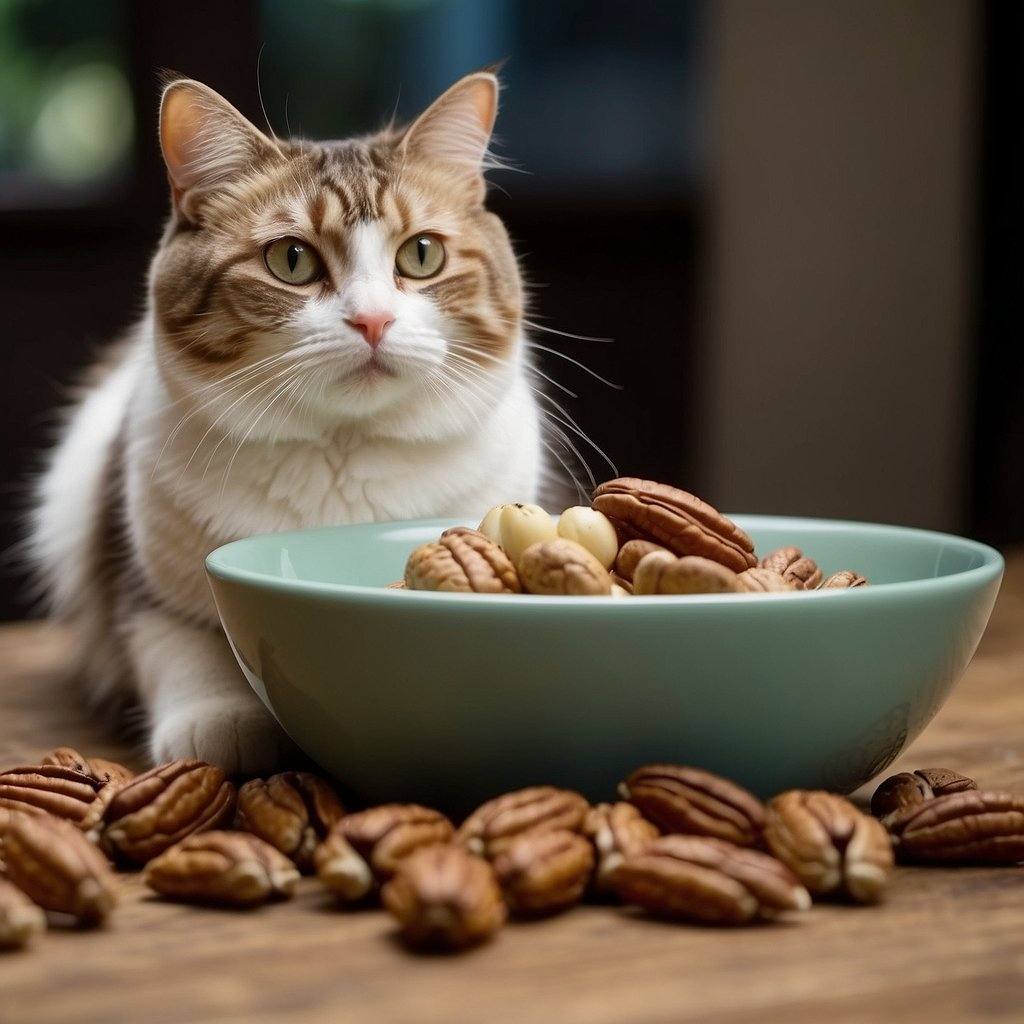
Hey there! Ever thought about whether those tasty pecans or macadamia nuts should make their way into your kitty’s snack time?
Well, even though a tiny nibble of pecan isn’t a cause for alarm, there are a couple of things you should consider when you’re looking at the long-term inclusion of pecans or macadamia nuts in your cat’s diet.
Can my pet eat nuts? Are nuts poisonous to my pet?
Incorporating Pecans into a Balanced Diet Your little furball primarily requires a diet rich in proteins, not fats and fibers. However, we get it, sometimes you just want to give them a little treat.
- Pecans in Moderation: Remember, moderation is key. Pecans can be an occasional treat, but they shouldn’t become a regular part of your cat’s diet.
- Caloric Content: A single ounce of pecans packs about 200 calories. That’s a hefty number for a small animal!
- Nutritional Content: That same ounce also includes 3 grams of protein but is high in fats.
If you do decide to share pecans, it’s just a tiny piece, okay?
Monitoring Cat Health Keep a close eye on your buddy after they’ve had pecans. Just like us, every cat is unique and so are their stomachs.
Watch out for:
- Upset stomach
- Lack of energy
- Changes in appetite or thirst
- Any sign of discomfort
If you notice any of these symptoms, it’s time to chat with your vet. Consider this your mini checklist to ensure your feline pal stays purring and healthy.
Are you taking notes? Great! Just proceed with caution and always put your cat’s health first when it comes to diet changes – especially with treats as rich as pecans.
In-Depth Nutritional Analysis of Pecans
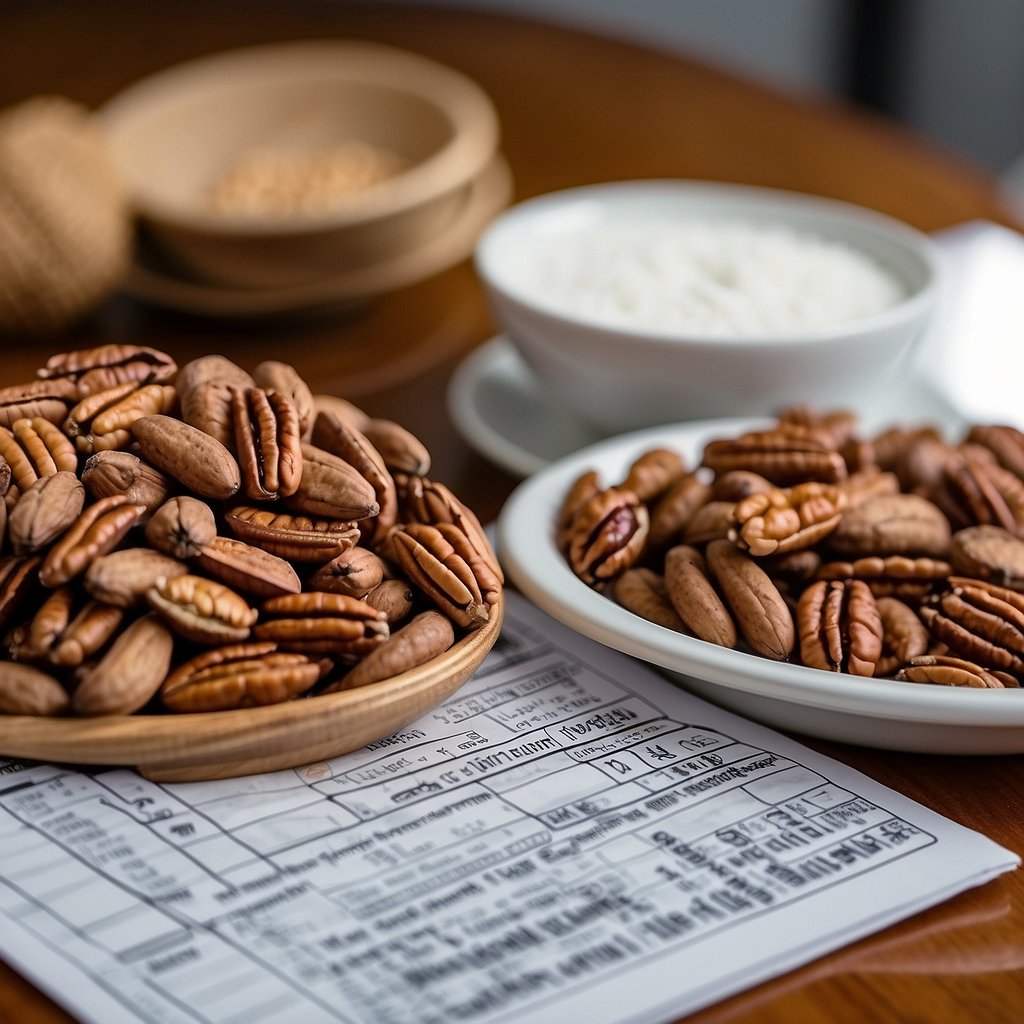
Ever cracked open a pecan and wondered what’s packed inside that tiny, brain-shaped shell? You’re in for a treat—pecans are not only delicious but also offer a bounty of nutrients.
Let’s take a peek at what these nuts have to offer.
Pecans are calorie-dense, with one ounce (about 28 grams) delivering roughly 196 calories.
They’re laced with healthy fats, consisting predominantly of monounsaturated fatty acids, which can be a hearty boost for your dietary fat needs.
For the detail-oriented nut lovers out there, here’s a precise nutritional breakdown per ounce:
| Nutrient | Amount |
| Calories | 196 kcal |
| Total Fat | 20.4g |
| Saturated Fat | 1.8g |
| Protein | 2.6g |
| Carbohydrates | 3.9g |
| Dietary Fiber | 2.7g |
| Vitamins | |
| Vitamin A | Trace |
| Vitamin E | 0.3mg |
| Minerals | |
| Calcium | 20mg |
| Potassium | 116mg |
| Zinc | 1.3mg |
Now, let’s talk omega-3 fatty acids, your heart’s friend, which pecans supply nicely! If you’re looking to add some crunch and also these essential fats, remember pecans can be a go-to. (5)
While they may not be a huge contributor to your vitamin A and E intake, pecans do offer a little something that contributes to your overall nutrient intake.
Plus, that hit of dietary fiber? It’s always a welcome guest for your digestive health.
The thing to keep in mind, though, is balance. Given their high calorie and fat content, enjoy pecans in moderation, especially if you’re keeping an eye on your waistline.
You’d be nuts to miss out on them completely, as they do add a lovely texture and taste to dishes. But as with all good things, it’s about finding the perfect portion.
Interactive and Engaging Content
Hey there, cat enthusiast! Have you ever pondered whether those tempting pecans you snack on are safe for your furry friend? Well, let’s put your knowledge to the test with a bite-sized quiz.
But first, a crunchy fact: pecans are packed with nutrients but are high in fats, so they aren’t the best treat for feline consumption.
Quick Quiz: Feline Foodie Edition
- True or False: Cats can safely eat pecans as part of their daily diet.
- Which nutrient in pecans is beneficial for a cat’s shiny coat?
- A) Vitamin A
- B) Omega-3 fatty acids
- C) Calcium
- How many calories are in one ounce of pecans?
- A) About 100 calories
- B) About 196 calories
- C) About 50 calories
Are your answers ready? Check them below:
- False – Pecans aren’t toxic, but they’re not recommended for your cat’s daily diet.
- B) Omega-3 fatty acids – These are great for skin health.
- B) About 196 calories – A hefty number for a small feline friend!
Next up, let’s chat! Here’s a cozy corner for you to participate in the conversation:
Community Corner
Have you ever caught your kitty nibbling on something they shouldn’t? Maybe you’ve tried giving them a pecan? Jump into the comments and share your whisker-licking stories or doubts with fellow cat parents.
Remember, while sharing is caring, it’s key for cat parents to ensure treats are safe and healthy for our purring pals.
With a mix of practical knowledge and community wisdom, you’re all set to be the top cat in the know! Keep those tails wagging, and always double-check with your vet when in doubt about your cat’s diet.
Alternatives to Pecans
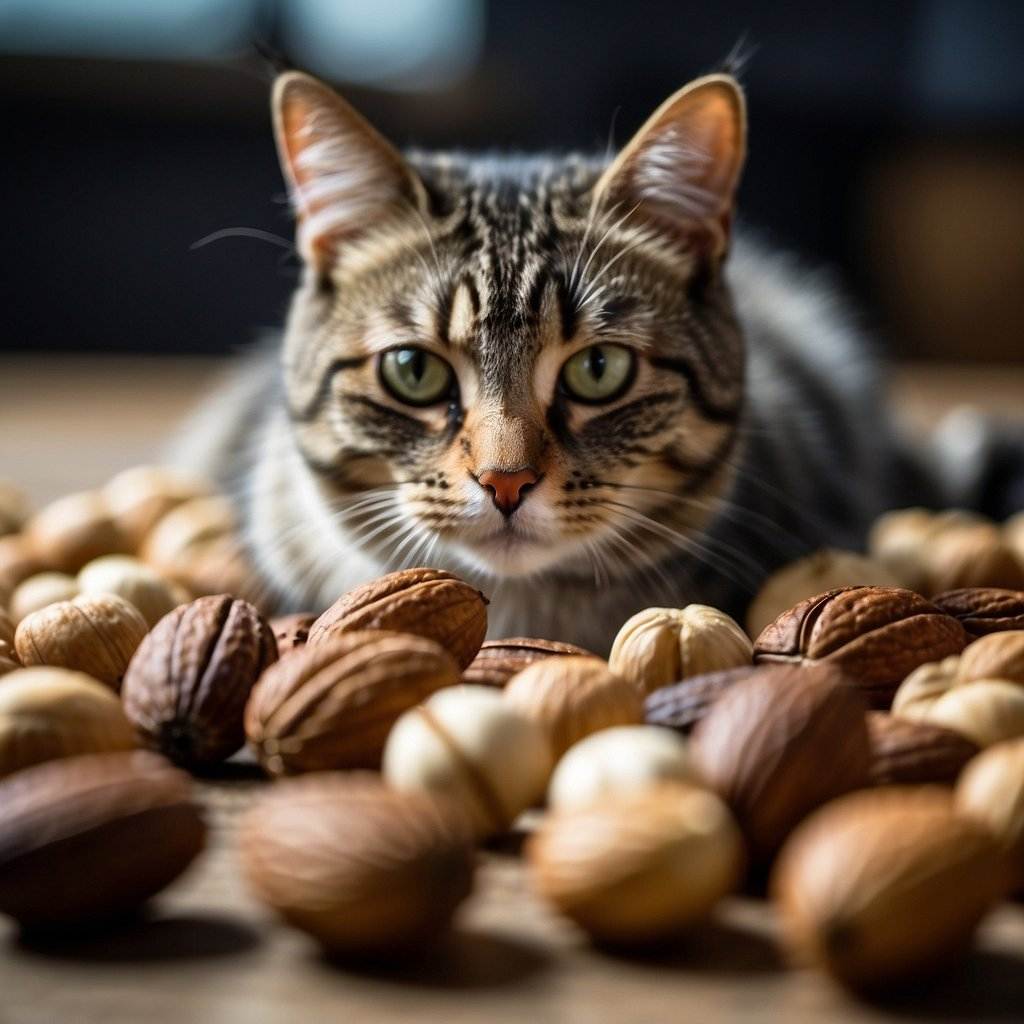
Curious about what to feed your feline that isn’t a pecan? You’re in luck! Let’s dive into some healthier snack options that’ll make your cat purr with delight.
Healthier Snack Options for Cats
- Catnip: It’s like happy hour for your cat! A sprinkle of this safe, herbal treat can provide great enjoyment.
- Cooked Meat: Think small, lean, and mean! Pieces of cooked chicken, turkey, or fish can be a great source of protein. (6)
When you’re tempted to give your feline friend a little human snack, remember that cats have specific nutritional needs.
Understanding Cats’ Nutritional Needs Cats are obligate carnivores, meaning they must have meat to thrive. Their diets should be:
- High in protein from meat or fish
- Moderate in fat
- Very low in carbohydrates
Here’s a quick table to guide you on a few alternative treats:
| Treat Type | Benefits | Serving Size |
| Catnip | Does not affect weight, keeps cats active | A small pinch |
| Cooked Meat | High in protein, loved by cats | Pea-sized bits |
While pecans may not be ideal, focusing on feline-friendly snacks that meet their nutritional needs can ensure your pet remains healthy and satisfied.
Remember, moderation is key. These snacks should complement, not replace, a balanced diet designed for your feline. No need to raid the nut stash; keep it simple and your kitty will thank you!
Expert Opinions and Veterinarian Advice
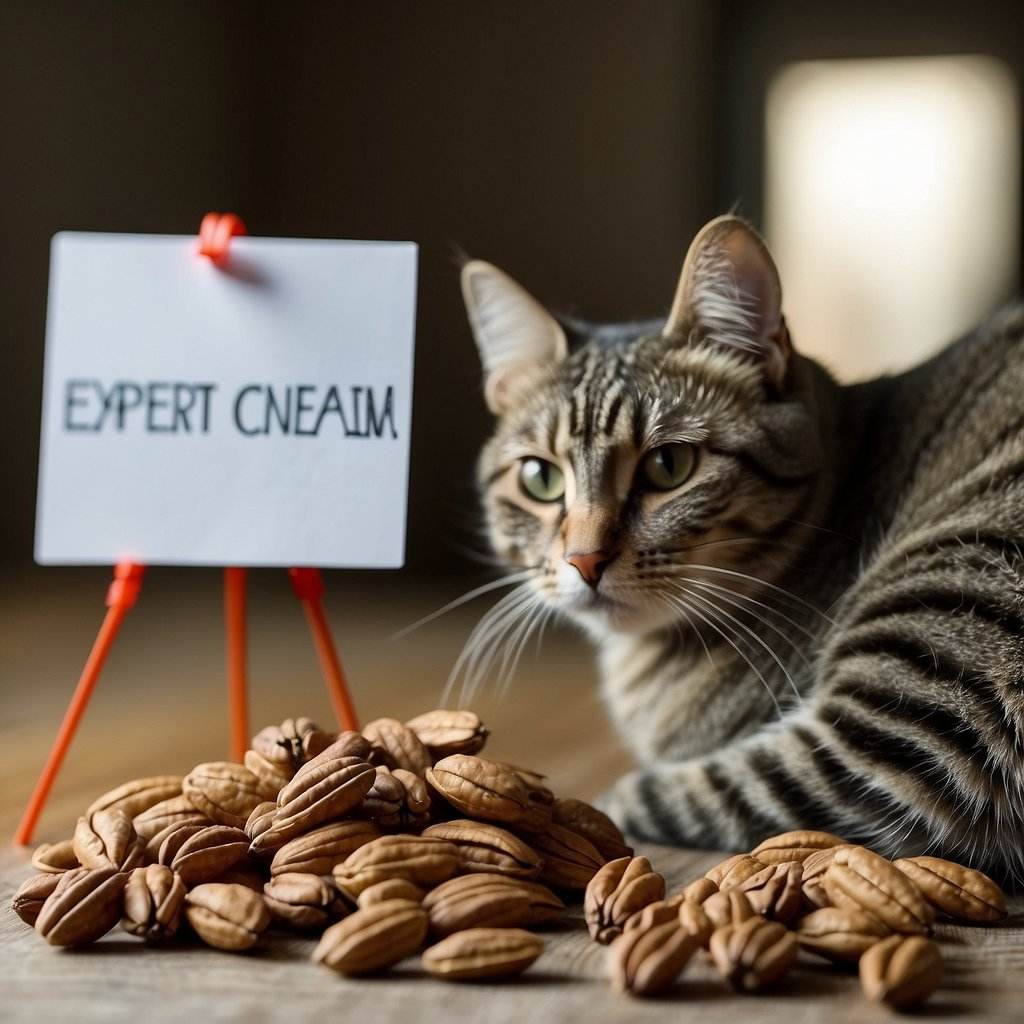
Have you ever caught your feline friend eyeing those pecans on your counter? You might wonder, “Can my cat snack on these?” Let’s crack into what the experts have to say.
Veterinarian Insights:
- High Fat Content: It’s common knowledge among vets that pecans boast a high-fat content. Too much fat isn’t a treat for your kitty’s tummy. Indeed, as experts highlight, this can lead to unwanted digestion issues or even obesity. (7)
- Not a Carnivore’s Choice: Cats are born carnivores. They thrive best on protein from meats, not pecans. A vet would tell you that while a pecan here and there probably won’t harm, it’s certainly not a dietary staple.
- Risk of Allergies: Some cats might be allergic. It’s a less common fact, but worth noting. As occasional treats go, pecans can be risky business.
But what does this all mean for your cat? Here’s a no-nuts-and-bolts take on it:
| Fact | Vets Say |
| Calories | 196 calories/ounce might pack on the pounds for your purrer. |
| High Fat | A whopping 20.4 grams, which can be hard to digest. |
| Dietary Fiber | At 2.7 grams, that’s quite a bit for a tiny tummy. |
Curious for more? If you’re a fan of dotting the i’s and crossing the t’s, check out these reputable sources to gnaw on some more information:
- American Society for the Prevention of Cruelty to Animals (ASPCA) – Toxic and Non-Toxic Plants List
- Cornell University College of Veterinary Medicine – Cats and Nutrition
In a nutshell, think of pecans like that knick-knack on the shelf – nice to look at, but not serving a purpose in your kitty’s diet.
Keep it balanced, and when in doubt, always opt for a vet’s opinion over a nutty risk!
Quick Recap
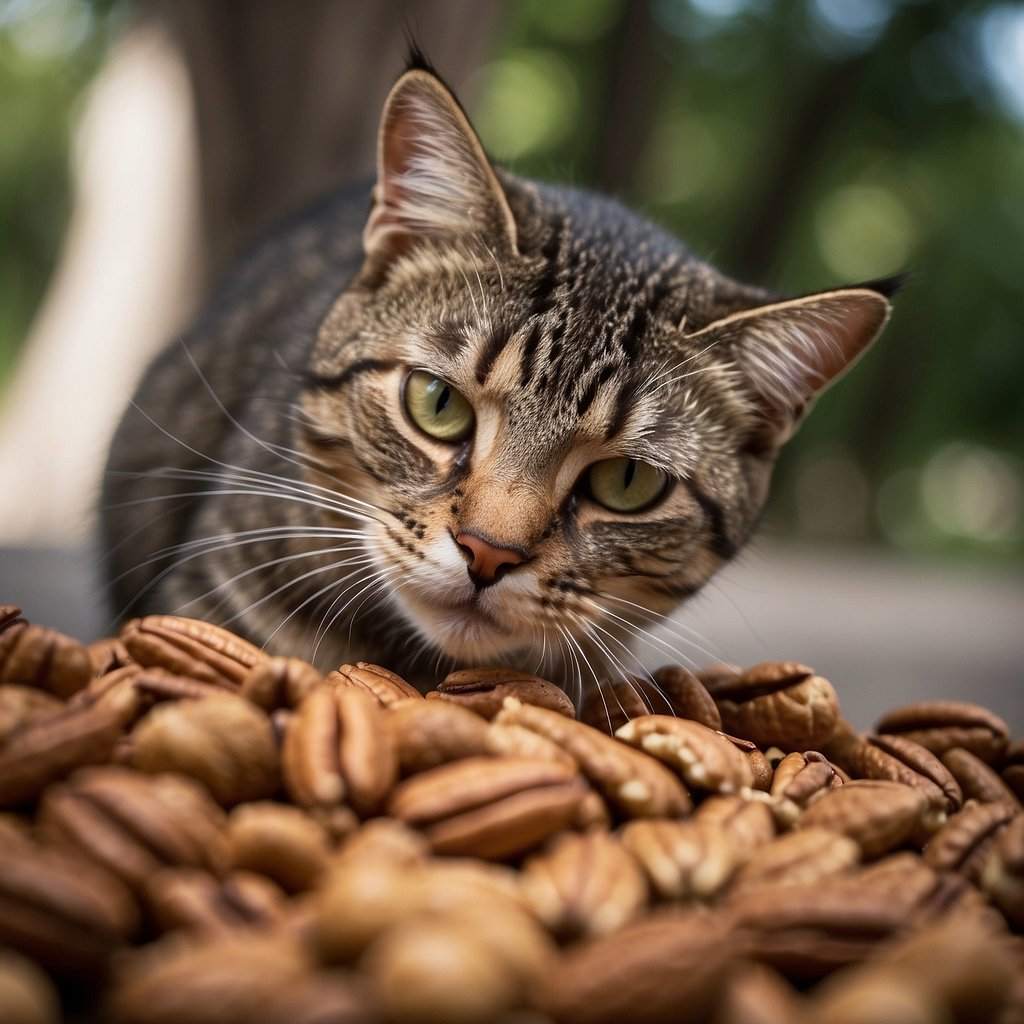
Have you ever caught your feline friend eyeing your bowl of pecans? Let’s break down the furry dilemma — can your cat munch on these nuts without a hitch?
Pecans & Cats: They’re not toxic, but this doesn’t mean offering them a free pass. Your little furball might handle an occasional pecan, but it’s not their ideal snack.
Nutrient Profile:
- Calories: Whoa, one ounce packs 196 calories!
- Fats: A whopping 20.4 grams, with 1.8 grams saturated.
- Fiber: 2.7 grams which can be hard to handle for kitty tummies.
- Plus, vitamins A and E, calcium, and zinc.
Feeding Tips:
- Moderation is Key: Too many pecans? Hello, weight gain and digestive woes.
- Watch Out: Some cats may show allergies to nuts.
Remember, your cat’s digestive system isn’t built to tackle high-fat treats like pecans. Feeding them can lead to stomach upset or worse.
Think of pecans as that one guest at the party who doesn’t fit in — they’re okay in a tiny quantity, but you wouldn’t want them there all the time, as they don’t provide the same nutritional benefits for cats as they do for humans and can cause gastrointestinal upset in cats and contribute to more serious conditions like pancreatitis.
It’s important to be aware of the potential risks, including the choking hazard, and lack of nutritional benefits when considering pecans as a snack for your feline friend.
Now, you’re informed and ready to keep those nuts away or give a teeny taste under supervision. Spare your kitty the stomach gymnastics and you both a vet trip — keep that nut bowl out of paw’s reach!
Keep these snippets of wisdom tucked away for snack time. You’ve got this!
Frequently Asked Questions
Curious about cats and their potential nutty snacks? Here’s what you need to know when contemplating sharing some of your pecan treats with your feline friend.
What types of nuts, if any, are safe for my cat to nibble on?
Most nuts, including almonds, walnuts, and pecans, are not recommended for cats. While not all nuts are toxic, they can be hard to digest and pose a choking risk.
It’s best to stick to foods formulated for cats.
My cat’s eyeing my pecan pie – should I be worried if she has a bite?
Yes, you should be cautious. Pecan pie contains sugar and other ingredients that are not suitable for cats.
Small amounts might not cause immediate harm, but it’s better to avoid letting her sample it.
I’ve heard some nuts could be bad for pets. Are pecans on the no-go list for cats?
Pecans are indeed on the no-go list. They’re not toxic, but their high-fat content and potential to cause digestive issues make them unsuitable for your cat.
Could giving my cat raw pecans lead to any health issues?
Yes, raw pecans can cause health issues in cats. Their high fat and calorie content can contribute to obesity and gastroenterological distress, even in small amounts.
Can sharing my pecan-flavored treats with my cat cause any harm?
Pecan-flavored treats often contain artificial flavors and sugars that are inappropriate for cats. It’s pertinent to avoid offering these kinds of treats to your cat.
Can pecans cause allergies in cats?
Just like humans, cats can have allergies to nuts. If your cat shows signs of an allergic reaction after eating pecans, consult your vet immediately.
Can kittens eat pecans safely?
Kittens have even more sensitive digestive systems than adult cats and giving them pecans could be detrimental.
It’s safe to say that pecans are not suitable for kittens, either.
- Free Online Casino Games: What You Need to Know - July 26, 2025
- Ideal Casinos Mobile: The Ultimate Guide to Mobile Betting - July 26, 2025
- The Ultimate Overview to Casino Site Gamings Online - July 26, 2025

